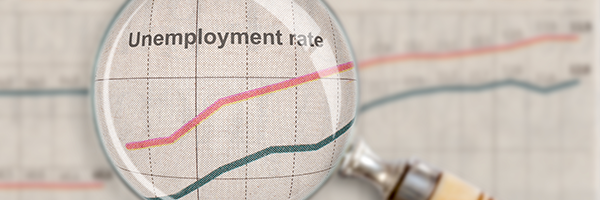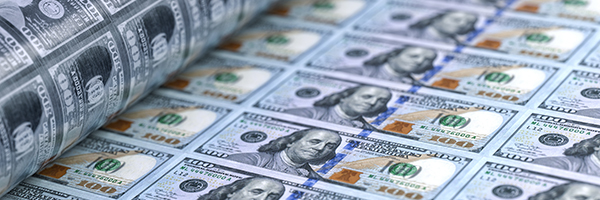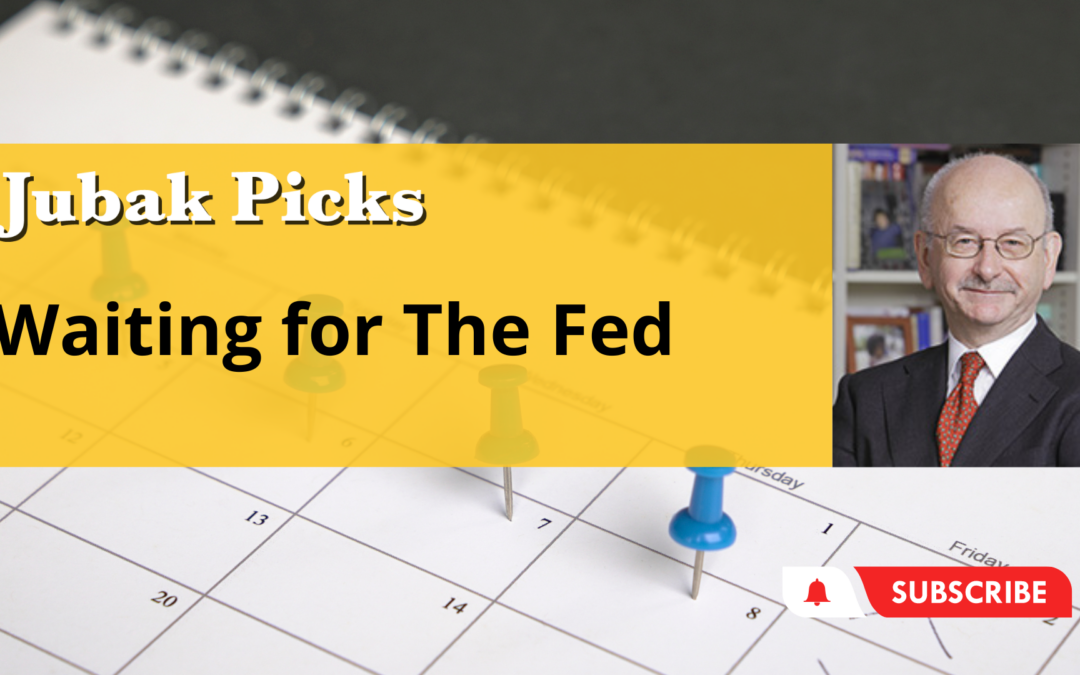
January 8, 2023 | Daily JAM, Morning Briefing |
On Thursday, before the New York market opens, the Bureau of Labor Statistics will report CPI inflation for December. This report will be the last before the Federal Reserve meets to set interest rates on February 1. The Fed already knows what the report says about inflation, but financial markets will react as if this new CPI inflation data will make the difference between a 50 basis-point increase (in line with the 50 basis-point increase on December 14) or will see the central bank send a positive signal on inflation and interest rates by slowing to a 25 basis-point increase. Right now the CME FedWatch Tool says the Fed Funds market is pricing in 86.6% odds of a 25- basis -point move and just 23.4% odds of a 50-basis-point increase.

January 4, 2023 | Daily JAM, Morning Briefing |
Minutes from the Federal Reserve’s December 14 meeting stressed the central bank’s commitment to bring inflation down to the target 2% even at the cost of a recession. Although the financial markets were thinking about the Fed beginning to cut interest rates in the second half of 2023, nothing in the minutes pointed to that likelihood. And in fact, the Fed went out of its way to say that financial markets were underestimating the length of time remaining in this cycle of higher interest rates.

January 4, 2023 | Daily JAM |
Late in December, the Bank of Japan announced, unexpectedly, that it was adjusting its policy for buying bonds. Even something as vague as that is enough to rattle financial markets because Japan is the world’s largest creditor. At the end of 2021, it held roughly $3.2 trillion in foreign assets, 30? more than No. 2 Germany. As of October, it owned over a trillion dollars of U.S. government debt, more than China. Japanese banks are the world’s largest cross-border lenders, with nearly $4.8 trillion in claims in other countries. The policy change was relatively minor–a decision to raise the ceiling on yields for the 10-year bond. But global bond markets have been waiting for any signs that say the days of 0% (or lower) bond yields in Japan might be coming to an end.

January 2, 2023 | Daily JAM |
The stock market in 2022 was extraordinarily event-driven. The Federal Reserve’s decision to, finally, raise interest rates and to raise them fast with four 75 basis point jumps during the year. Russia’s invasion of Ukraine and the resulting shock to energy and food commodity markets. OPEC’s decision to reduce production. The big slowdown in China’s economy as the country first fought Covid with the lockdowns of major cities and industrial regions and then reversed course to no Covid policy at all. The unexpected (by many) ability of Democrats in Congress and the Biden administration to pass legislation with unprecedented levels of spending on clean energy technology and other efforts to slow the rise in global temperatures. 2023 will come with its own set of new (and revisited) market-moving events. Once again I think we’re looking at a year where market trends aren’t determined by revenue and earnings but by big events outside the market itself. Here’s my forecast of the 10 events (or trends or whatever) that will move stocks in 2023. I’ve tried to put them in some rough kind of chronological order so you’ll know when to what for events to unfold and ripple out into the financial markets.

January 2, 2023 | Daily JAM, Morning Briefing |
It’s deja vu all over again as New York stock markets reopen for trading tomorrow.
We ended 2022 waiting for the monthly jobs report from the Labor Department to tell us when slower job growth would signal the potential end to the Federal Reserve’s cycle of interest rate increases. And we’re beginning 2023 the same way. The Labor Department will release the jobs report for December on Friday at 8:30 a.m. New York time. Economists surveyed by Bloomberg are projecting that the economy added 200,000 jobs in the month.That would be a strong but not too strong figure that’s unlikely to provide much clarity on the temperature of the jobs market or Federal Reserve policy. That’s especially true because the December jobs report is subject to significant seasonal error because government statisticians struggle to figure out how to adjust the data for seasonal holiday hiring. The Friday report will be preceded this week by the Job Openings and Labor Turnover Survey (or JOLTS report), ADP’s private payrolls data, and the Challenger Job Cuts report.

December 14, 2022 | Daily JAM |
The Federal Reserve raised interest rates by 50 basis points today, December 14. That was a significant step down from the series of 75 basis point increases that the Fed has imposed this year. But in its Dot Plot projection and in Fed chair Jerome Powell’s comments after the rate announcement, the central bank signaled that it will raise interest rates to a higher peak and keep them at that level for longer than the financial markets had hoped. Stocks slipped on the combination of small rate increase and higher projected peak.

December 14, 2022 | Daily JAM, Morning Briefing |
If as expected the Federal Reserve raises interest rates today by just 50 basis points, many investors–and perhaps the entire stock market–will see that as a sign that the Federal Reserve is poised to begin a pivot from its policy of aggressive interest rate increases. And that it will pause those interest rate increases relatively soon. Perhaps after another two 25 basis point increases in February and March. Will Fed chair Jerome Powell try to talk the market out of this belief?

December 14, 2022 | Daily JAM |
Today I posted my two-hundred-and-seventeenth YouTube video: Where Do We Go From Here?
Today’s topic: Where Do We Go From Here? We got better-than-expected CPI inflation numbers yesterday. Economists were expecting a 7.3% headline annual rate and we got 7.1%. For the core rate, expectations were at 6.1% and we got 6.0%. In the hour following the CPI report, the S&P 500 jumped about 1.6%. If the Fed announces the expected 50 basis point rate hike and doesn’t shock the market with unexpected bad news, we’ll likely see a traditional Santa Claus rally. The question of the Fed’s Dot Plot projections remains my long-term concern–as we try to understand how long the Fed will continue to raise rates and when we are likely to hit the Fed’s goal of a 2% inflation rate. We’re currently at about 7% and I expect getting down to 5% or so will be pretty painless. Beyond that, How we go from 4-5% to 2%? could be the crucial question for 2023. Until that 2% is in view for the Fed, I don’t think the central bank will back off completely. We’ll see if this Santa Claus rally can stay convincingly above 4,000 in the S&P 500. If we do move above that level, I think we can expect the rally to continue until about February or maybe even early March. And then we’re likely to see a drop in stocks because of a lower growth rate for corporate earnings and continued inflation fighting from the Fed.

December 12, 2022 | Daily JAM, Morning Briefing |
Tomorrow, Tuesday, December 13, the Bureau of Labor Statistics will report November CPI inflation. Economists surveyed by Bloomberg estimate headline CPI to increase by 0.3% for the second consecutive month, with year-over-year CPI falling from 7.7% to 7.3%. Core CPI inflation, which excludes food and energy prices, is projected to climb at a 0.3% monthly rate or 6.1% year over year. (I would note that economists have underestimated the inflation rate in five of the last seven months.) Yes, inflation is slowing and it looks like we have seen a peak in the inflation rate. But, and it’s a big BUT, inflation is falling at a very slow rate.

December 7, 2022 | Daily JAM, Videos |
Today I posted my two-hundred-and-fourteenth YouTube video: Waiting for the Fed. We are about a week out from the Fed’s December 14 meeting, where another 50 basis point increase is expected. We’re now in the Fed’s quiet period, but last week Fed presidents were adamantly setting expectations for 50 basis points. A 50 basis point increase would be a step down from the previous 75 basis points, and many would see that as a sign that the Fed is tapering. However, the main thing to look at on December 14 is the Dot Plot of projections from the Fed itself. That will tell investors and traders how much longer the Fed now expects these raises to continue, and how where the peak might be in rates for this cycle. Wall Street is currently predicting a peak 5% benchmark rate. (We’re currently at 3.75-4%.) But I think the top is likely closer to 6%. If the Fed settles into a projection of 5%, the market will likely relax and head into an end-of-year rally that might end in the beginning to mid-January. If the Fed gives any impression that it’s looking looks at something closer to 5.5 to 6%, that would be enough to scare the market and lead Wall Street to lower projections of market gains for 2023. Right now the S&P 500 continues to teeter on the edge of resistance near the 4,000 ceiling set by previous highs of 4110 in September and 4080 at the end of November. If the Fed doesn’t come out with jarring news on the 14th, I think we can look for the index to break through 4000 until it heads back down in January 2023.

December 1, 2022 | Daily JAM, Morning Briefing |
Inflation progress in October but painfully slow. PCE–personal consumption expenditure–in inflation, the Federal Reserve’s preferred inflation index, rose at a 6% rate year over year rate through October. That was down from a 6.3% rate in September. The core PCE index, which strips out food and energy costs, rose at a 5% rate, roughly where it’s been for most of 2022.

November 30, 2022 | Daily JAM, Morning Briefing |
In a speech today Federal Reserve Chair Jerome Powell clearly confirmed what other Fed officials have said this week: 1. The Fed will raise interest rates at its December 14 meeting by 50 basis points and not 75. That would follow on four straight 75 basis point interest rate increases. 2. The Fed will moderate the pace of its interest rate increases going forward. 3. The peak for the Fed’s benchmark interest rate will be “somewhat higher” than estimated in September. The Fed’s estimate in September was for a peak of 4.6% in 2023. The current benchmark rate is 3.75% to 4.00%. The Fed Funds futures market sees rates peaking at about 5% in the second quarter of 2023. What he didn’t clarify is what that peak rate might be or when the financial markets might see it.













